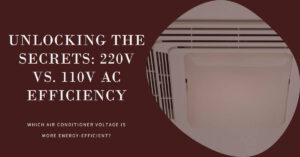Image: “Article Feature Image” by Bing, Source: [Bing Graphic Art].
AC (Alternating Current) systems play a crucial role in powering our modern world. Voltage, an essential component of AC, determines the electrical potential difference and is a critical parameter in electrical systems.
However, when voltage levels exceed their intended limits, it can lead to significant damage to AC systems.
Yes, high voltage can damage AC systems. High voltage has the potential to damage AC systems due to several reasons. When voltage levels exceed the designed limits, it can lead to electrical overstress, causing stress on components and possible malfunctions or failures.
In this article, we will explore the effects of high voltage on AC systems, potential risks to human safety, and measures to protect against high voltage damage.
Understanding Voltage
Voltage, often measured in volts (V), refers to the electrical potential difference between two points in a circuit.
In AC systems, voltage continually changes direction, oscillating between positive and negative values. Several factors affect voltage, including the power generation source, transformer configurations, and the specific application.
AC systems commonly operate at different voltage levels, such as residential systems at 120V or 240V, and industrial systems at higher levels.
Effects of High Voltage on AC
High voltage can have detrimental effects on AC systems, leading to electrical overstress, insulation breakdown, and equipment damage.
High voltage can have adverse effects on AC compressors, control circuits, and airflow fans. Here’s a breakdown of how high voltage can impact each component:
- AC Compressor: High voltage can cause excessive electrical stress on the AC compressor, leading to several issues:
- Overheating: Increased voltage can result in excessive heat generation, causing the compressor to overheat and potentially fail.
- Motor Burnout: The compressor motor can experience burnout due to the increased electrical load caused by high voltage, resulting in motor failure.
- Reduced Lifespan: Continuous exposure to high voltage can significantly reduce the lifespan of the compressor, necessitating premature replacement.
- Control Circuit: High voltage can negatively affect the control circuitry responsible for regulating and monitoring the AC system. Some impacts include:
- Circuit Malfunction: Excessive voltage can cause the control circuit to malfunction or fail, disrupting the proper operation of the AC system.
- Component Damage: High voltage can damage sensitive electronic components in the control circuit, leading to unreliable or erratic system performance.
- Safety Risks: Control circuit failures due to high voltage can compromise safety features, such as overload protection or fault detection.
- Air Flow Fan: High voltage can impact the airflow fan, which is responsible for circulating air throughout the AC system. The effects include:
- Motor Damage: Increased voltage can stress the fan motor, potentially causing it to malfunction, overheat, or burn out.
- Unbalanced Operation: High voltage can disrupt the fan’s rotational speed, leading to unbalanced operation and reduced efficiency.
- Poor Cooling: If the airflow fan is unable to operate at its optimal speed due to voltage issues, it can result in inadequate cooling and reduced comfort.
In summary, high voltage can damage the AC compressor, compromise the control circuit’s functionality, and affect the airflow fan’s performance.
It is crucial to ensure that voltage levels remain within the specified limits to prevent these issues and maintain the proper functioning of the AC system.
Regular maintenance, voltage regulation, and surge protection can help mitigate the risks associated with high voltage.
Human Safety Concerns
High voltage poses substantial risks to human safety. Electric shocks can occur when individuals come into contact with high-voltage components, leading to severe injuries or even fatalities.
Fire hazards are also associated with high voltage, as excessive electrical energy can ignite flammable materials or overload wiring, resulting in electrical fires.
To ensure safety, following proper precautions and adhering to electrical regulations are essential.
Protection Measures
To mitigate the risks of high voltage damage, various protection measures can be implemented. Surge protection devices are designed to divert excessive voltage spikes away from sensitive equipment, safeguarding them from damage.
Voltage regulation plays a crucial role in maintaining stable voltage levels within the desired range, preventing equipment stress and failures.
Installing voltage regulators can help regulate voltage fluctuations and ensure smooth operation.
Conclusion
In summary, high voltage can damage the AC compressor, compromise the control circuit’s functionality, and affect the airflow fan’s performance.
The consequences of such damage extend to human safety risks, including electric shocks and fire hazards.
To protect AC systems from high voltage damage, employing surge protection devices and voltage regulation techniques is crucial.
By understanding the risks associated with high voltage and implementing appropriate measures, we can ensure the reliability, longevity, and safety of our AC systems


